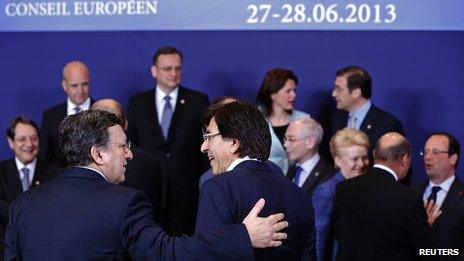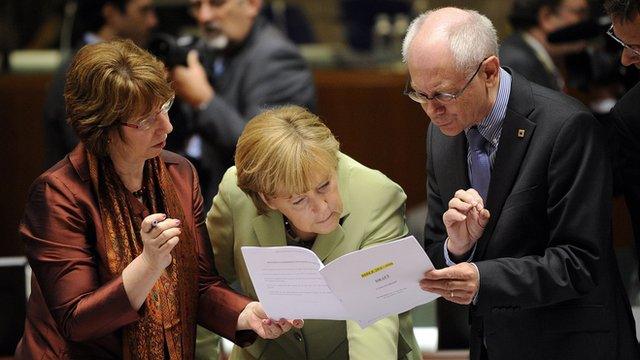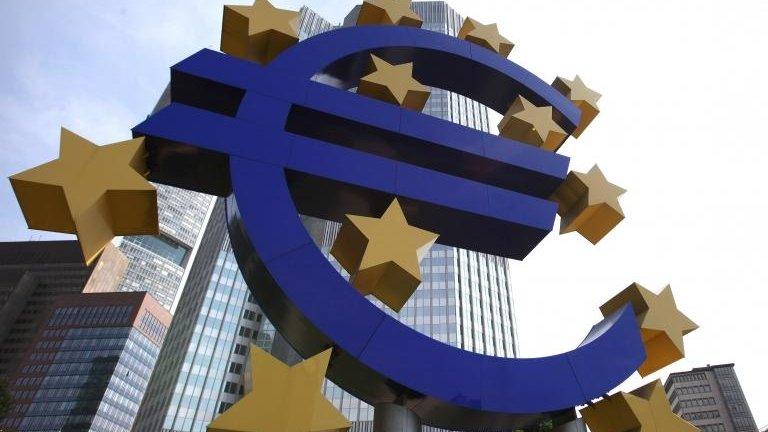Europe struggles for reform amid euro woes
- Published
- comments

Economic stagnation is limiting EU leaders' scope in tackling unemployment
Europe's leaders have allowed themselves a moment of satisfaction. The crisis has been so deep that when - as they did in this summit - they concluded a string of agreements they slapped backs and embraced.
Yet Europe's crisis has not been tamed. It is managed from one month to another.
This summit was supposed to be about youth unemployment. In recent months it has risen up the political agenda. It is seen not just as a waste of young lives but as a threat to the European project. The words "Lost Generation" have almost become a cliche, but nearly six million under 25-year-olds are without work. The German Chancellor Angela Merkel told the meeting in Brussels that the challenge was simple: "youth unemployment had to go down".
So 6bn euros (£5bn; $8bn) from the EU's budget has been diverted to fight unemployment. Most of it will be spent in the two years after 2014 to guarantee jobless young people further training. The President of the European Council, Herman Van Rompuy, said "beyond the six billion that we reserved in February, there will be substantially more available for the youth employment initiative, according to projections at least eight billion euros in total".
The figures make for a headline, but almost no one in Brussels believes it is a game-changer. The President of the European Parliament, Martin Schulz, described the package as "a drop in the ocean". And Chancellor Merkel herself said "the main thing here is about improving competitiveness. It is not about more and more pots of money". And - with an eye no doubt to the German elections in September - she did not offer any new funding to get Europe working again.
Budget deal
Most officials recognise that unemployment will only start coming down when growth returns - and that will not be until next year at the earliest. And to make a significant impact on the unemployment lines growth has to exceed 1.5%.
The summit also agreed on an EU budget for the next seven years. It will be 960bn euros and follows months of argument. The figure had been negotiated in February by the heads of government and was the first time the EU budget had been reduced, but many MEPs had fiercely resisted the idea that an EU budget could be slimmed down. They have won concessions. They will be able to roll over funds not spent, rather than see them returned to member states and that, in theory, could lead to a slight increase in money spent. The European Parliament is expected to approve the package next week.
There was a minor row over Britain's rebate. French officials had suggested that changes to rural development funds for newer member states from Eastern and Central Europe could change the calculations for the UK rebate - perhaps reducing it by as much as £300m a year. Prime Minister David Cameron immediately sought - and got - reassurances that nothing had changed. It led to some tension and some muttering once again about the British.
The previous night Europe's finance ministers had agreed on a common set of rules as to who pays the bill if a bank collapses. Instead of the taxpayer shouldering the burden the bank's shareholders, bondholders and depositors holding more than 100,000 euros will take losses. It is an important step to ending the loop whereby indebted banks - too big to fail - have their losses placed on the government's books.
But these plans will not come into effect until 2018 and Europe is a long way from agreeing a common fund to wind up failing banks.
Despite these steps Europe remains in crisis. It might burn less intensely than a year ago, but it has not disappeared.
In many countries unemployment is expected to continue rising until early in 2014.
Spain and Italy are struggling to escape recession. In Spain retail sales fell 4.6% in May from a year earlier. That is the 35th month in a row that sales have fallen.
The Republic of Ireland was declared back in recession yesterday. In Portugal there is increasing resistance to austerity. In France consumer confidence has fallen to its lowest levels since records began in 1972. Its spending watchdog on Thursday said that if the French economy failed to grow by 0.1% then the deficit would be as high as 4.1% in 2013 and so breach agreed limits. In Greece the economy continues to shrink - albeit less slowly - and its plans to raise money from privatisations are in trouble.
The list of difficulties is long. There are, here and there, some green shoots. But the fear persists that Europe - determined to defend its single currency - faces a future of stagnation.
- Published28 June 2013

- Published27 June 2013
